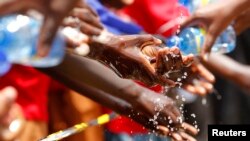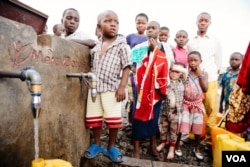Thursday is World Handwashing Day. Seven years ago health campaigners including UNICEF and the U.S. Agency for International Development decided October 15 would be the day that we celebrate handwashing and remind ourselves of its health benefits.
In 2008, UNICEF estimated that three and a half million children die annually from diarrheal diseases and pneumonia. Regular handwashing with soap could save up to 30 percent of those lives.
A song blares out from a truck trailer in Goma. Aimed at mothers, it tells them to wash their hands with soap at five key moments: before cooking, before giving food to their children, before eating, after going to the bathroom and after cleaning their children. And if they don’t have soap, they can also use ashes.
A popular comedian, Djassa Djassa, leads the campaign from the trailer, singing, dancing and dispensing health advice.
“There’s no connection between your children teething and diarrhea,” he told the parents. “No mama, it’s the dirt under your fingernails."
The American aid organization Mercy Corps said a recent survey found that less than a third of the population wash their hands at all the five moments, including before giving food to their children, for example.
And few people use soap at all the five moments.
I know many of you have toilets, but if I offered you $20 (U.S.) I bet you couldn’t show me a toilet with soap next to it, Djassa Djassa said.
A Mercy Corps survey found there are several obstacles to handwashing besides lack of access to water; many people said they simply forget, or it’s not in their culture.
But water access is a major problem in Goma, where the water utility’s network was wrecked by a volcanic eruption in 2002.
Recently Mercy Corps put in 52 tapstands around town. The price of water at those stands is equivalent to about 5 U.S. cents per 20 liters, compared with 30 or 40 U.S. cents that truck and motorbike water vendors were charging.





